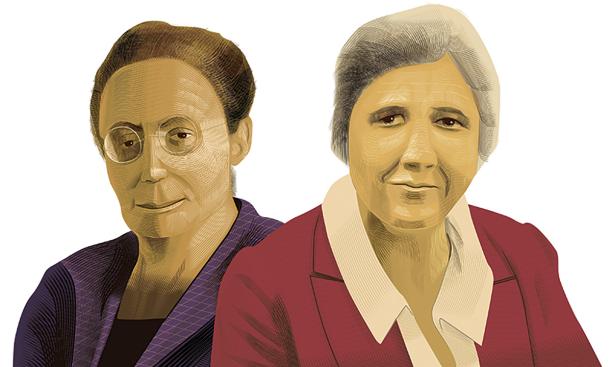
Emmy Noether and Anna Pell Wheeler knew each other for just a few years. But they were important years. Their story shows how universities can advance a field just by inviting people in.
When Noether was college-aged, women weren’t allowed to enroll in German universities. She audited classes for years, until finally a new law let her enroll at the University of Erlangen. In 1907, she received a Ph.D. in mathematics summa cum laude. Afterward, the university, recognizing her rare talent, let her give lectures — though of course without pay.
Once, when a famous colleague was scheduled to give a lecture, the men debated whether Noether, as a woman, could attend. Finally, one of them said, “Gentlemen, this is an academic society, not a bathing club.” That settled it: Noether could hear the lecture. From behind a screen.
In 1915, Noether moved to the University of Göttingen, then called “the world center of mathematics.” There, she gave lectures on behalf of the mathematician David Hilbert. In 1922, her department successfully petitioned the government to finally make her a professor. But in 1933, when the Nazi regime purged the academy of non-Aryans, Noether, who was Jewish, lost her hard-won position.
Anna Wheeler, meanwhile, grew up in Iowa. She piled up degrees from the University of South Dakota, the University of Iowa, Radcliffe College, and the University of Chicago, where she earned a Ph.D. She, too, faced sexism — she told an acquaintance, “I had hoped for a position in one of the good [public universities] … but there is such an objection to women that they prefer a man even if he is inferior both in training and research” — but she ultimately succeeded, becoming a mathematics professor at Bryn Mawr College. She married a Princeton professor named Arthur Wheeler and moved to Princeton, where she was active in the mathematics community while still teaching at Bryn Mawr.
In the 1930s and 1940s, Princeton’s mathematics community worked heroically to bring refugee scholars to the United States. Wheeler was part of these efforts, helping women scholars in particular to find places at Bryn Mawr. Thanks to her, Noether was able to come to the United States as a visiting professor at Bryn Mawr and a lecturer at the Institute for Advanced Study. To this day, Princeton is justly proud of its association with the very eminent Noether. In those years, Göttingen ceased to be the world center of mathematics — and Princeton took that title.
“I had hoped for a position in one of the good [public universities] … but there is such an objection to women that they prefer a man even if he is inferior both in training and research.”
— Anna Pell Wheeler
In Germany, Noether heard that “the people at Bryn Mawr were very sophisticated and everyone wore hats.” So when Wheeler picked her up in Philadelphia, Noether was wearing a fancy hat — and feeling very ill at ease. When she saw that Wheeler, though smartly dressed, was hatless, she gleefully threw her hat away.
Back then, the official hobby of mathematicians was hiking. Wheeler owned a cottage in the Adirondacks, and she took students on nature walks and taught them bird calls. Soon, she and Noether, who became great friends, were both leading mathematical hikes in Princeton and Pennsylvania.
A student wrote to Wheeler, upon her retirement, about how a great professor moves her field forward by helping others to belong in it: “I remember the foot marks on the wall of the math seminar room. You had the habit of standing on one foot … . I remember your stopping the car at an intersection in the middle of nowhere while you tried to identify a bird call which only you had heard … . But most of all I remember my father’s words after he met you on Commencement Day in 1930. The thought of his daughter aspiring to be a female mathematician was a bit horrifying to him. However, after he met you, he said, ‘Such a woman I would like you to be.’”
